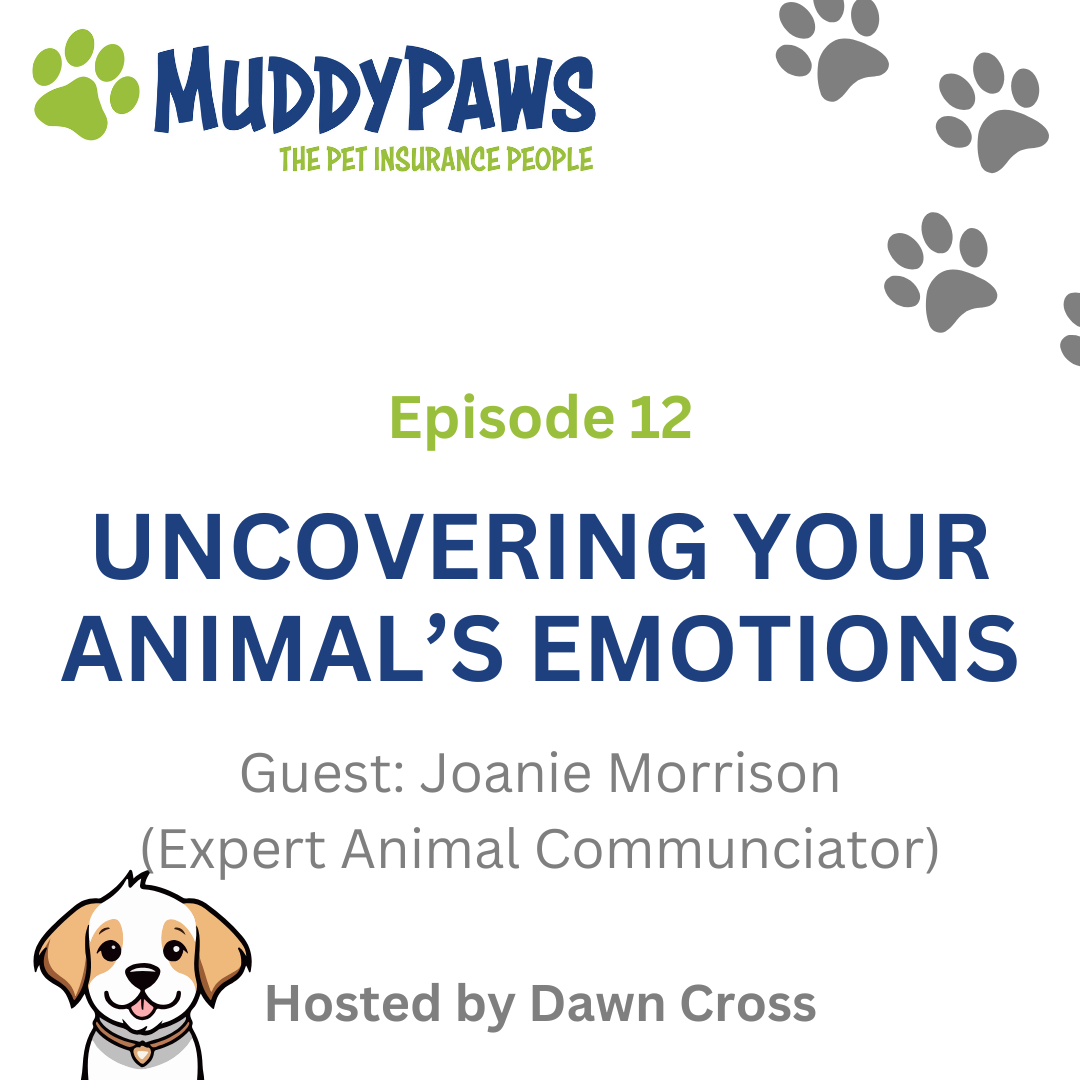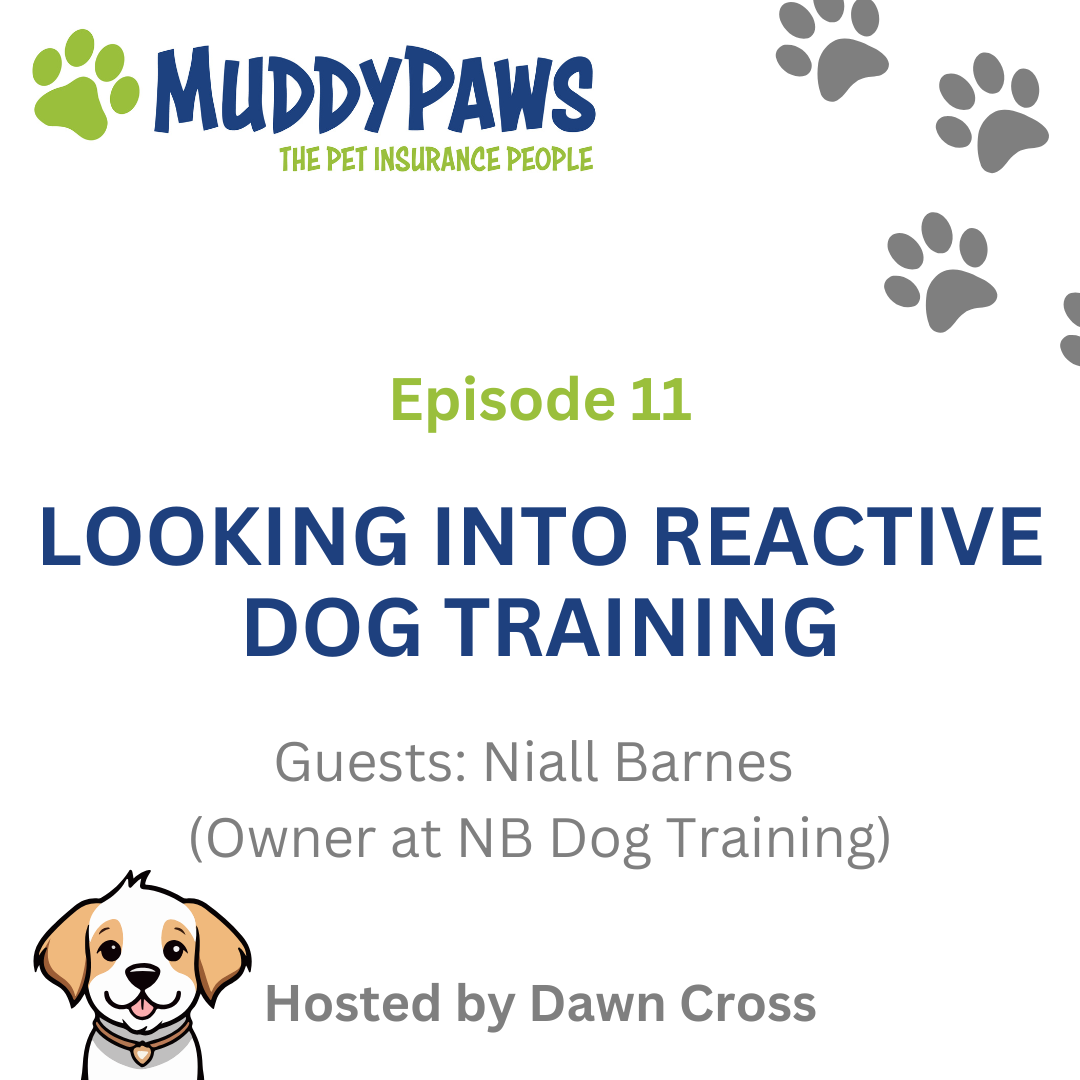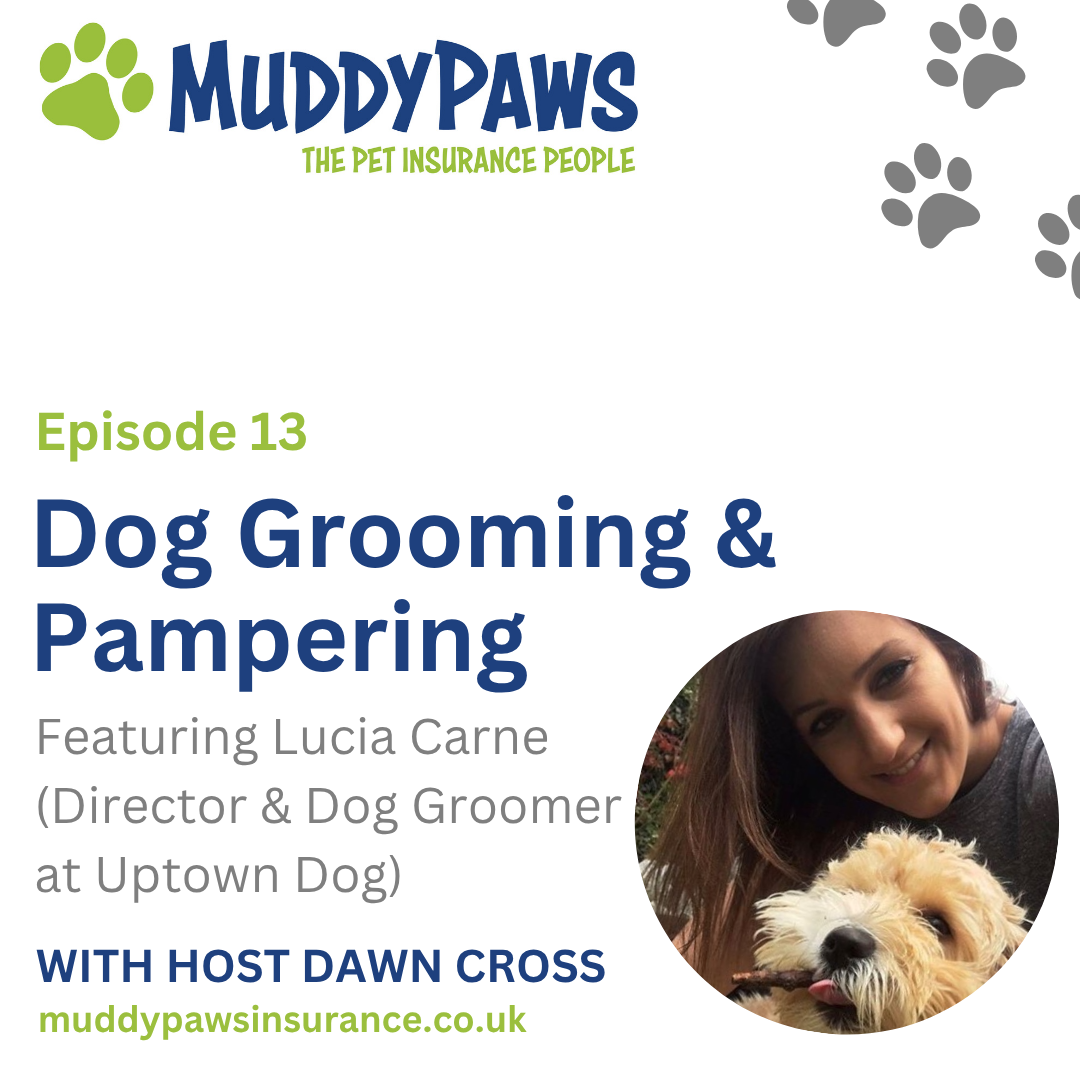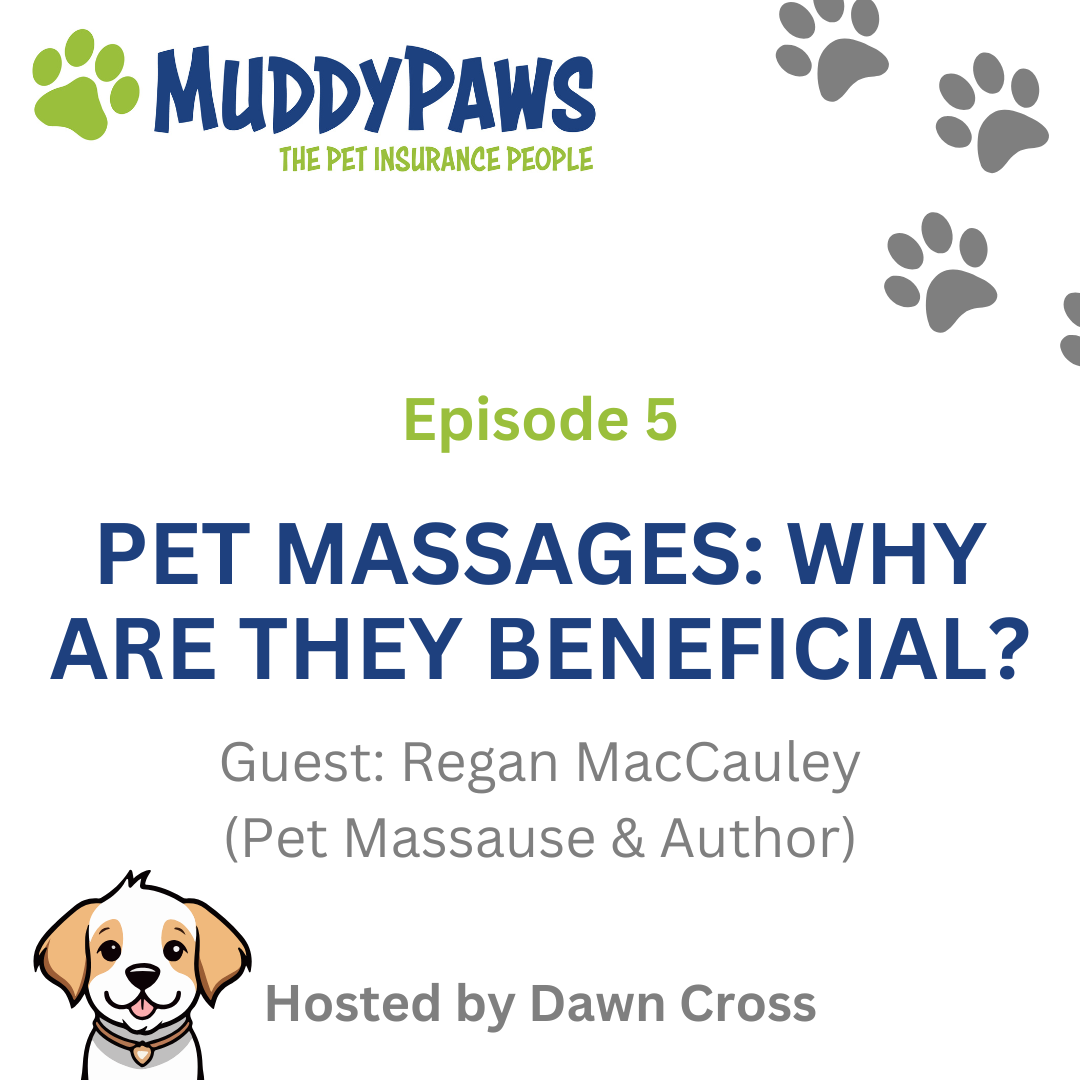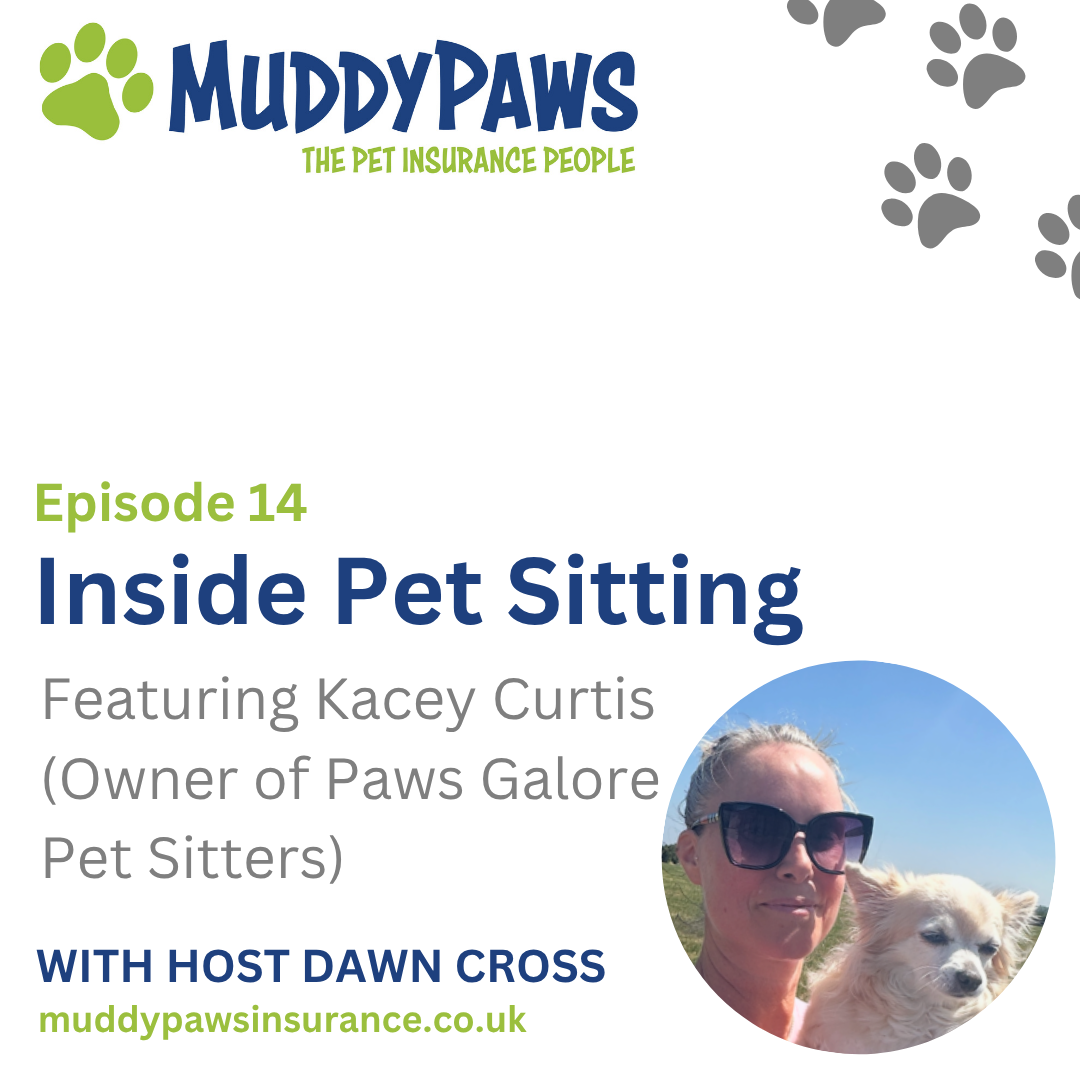Episode Transcript
[00:00:02] Speaker A: Welcome to the Muddy Paws Insurance Podcast. I'm your host, Dawn Cross, and today I'll be discussing uncovering your pet's emotions with Joni Morrison, expert animal communicator.
If you enjoy our podcast, make sure to leave a rating on your favorite podcast directory.
[00:00:19] Speaker B: Brilliant. So if I could get you to start off and introduce yourself and what you get up to.
[00:00:24] Speaker C: Okay. Hi, I'm Joanie Morrison.
I would. It's safe to say that I've been an advocate for animals for most of my life in one capacity or the other. So I've been a veterinary technician, I've been a horse trainer. Still have my hand in both of those. But I'm also an animal communicator, and that's really my true passion.
[00:00:48] Speaker B: That sounds amazing. So what got you started in your line of work?
[00:00:54] Speaker C: I think always wanting to be with animals and loving animals and always having that connection. I didn't really realize that I had the connection that I did until later on in life.
So it's been an evolution for sure. I had connections with animals when I was little. My family is a real media oriented. Like, I'm in my dad's studio right now, and I don't know anything about the lighting, so you set this all up. But I was in the corner saving the squirrel or playing with the ducks or, you know, I was never part of the media part of my family. I was just kind of doing my own thing. Always knew I had a connection. Didn't know how extensive that connection was. And it's evolved into what I do now, which is identifying and clearing past emotional trauma and pets and humans and clearing it. So. So it's been quite the journey, but lots of amazing stories.
[00:01:56] Speaker B: That sounds amazing. Do you have kind of like, you know, a first memory or story that you have of kind of when you realize you had that special connection with animals?
[00:02:07] Speaker C: That's such a great question.
I think dating me, probably close to 30 years ago, I was working for a veterinarian out in California, and we were working a really sick dog. And it was in a treatment cage within the treatment area. And all of a sudden I started hearing this voice seemingly coming from this corner, but no one was there but the dog. And so it was just like, wait, what? And so I went over and the dog was like, please don't leave me. I'm scared. I'm this. And. And I was just like, oh, my gosh. So it was like petting him. And. And I. I was kind of looking around like, is anybody else hearing this? Because like it was just sort of like somebody talking to me. And I ran and grabbed a friend that I work with, ran into another ward and I said, oh my gosh, this just happened. She goes, and I said, why do, why do you think I heard this dog? And she said, well, it's easy. You're the one who's with this dog the most. I was the technician that took care of the dog. I transferred the dog at the end of the day to the emergency hospital. So the dog felt comfortable enough with me and apparently I had the abilities to be able to talk to the dog and, and the dog was understanding that and was conveying these messages to me. So it was kind of one of those in your face moments where you just, you're, you're second guessing it. But at the same time it was like, wow, this is pretty incredible. So I think over the years and so that was like 30 years ago, it's just kind of morphed into more of an allowance of it coming in if, if that makes sense. Before it was like I thought I, I feel like I thought my way through it or try to think my way into communicating with animals, but I honestly, that wasn't what I needed to be doing. I need to be feeling my way into it. And so it was kind of this trial and error for years and wasn't, you know, it wasn't my bread and butter. It was just like, wow, I have this connection with animals.
How can I, you know, build on this or empower this or help animals this way? And so again, it's just been an amazing journey just to get to where I've been, to be able to help them and heal them in the capacity that been able to do for the last 10 years.
[00:04:29] Speaker B: Wow, that sounds really amazing and almost kind of inspirational. You know, the, the fact that the dog felt so comfortable with you, there's like you were able to kind of pick up on that is really amazing because also then you could attend to his needs and being like, you know, yeah, I'll stay here. Then you're obviously feeling scared and lonely and it must have been so useful down the line doing what you do now.
[00:04:54] Speaker C: Yes, for sure. And still to this day I'm still a veterinary technician because I like the hands on physical with the animals, the medical aspect of it, because all my work is done remotely. So I just ask for little to no information to begin with, just a picture name and age because it's imperative for your pet to tell me what's most important to them because you Know, humans are. Their owners come in with preconceived notions of this is my dog, and my dog is this and likes this. And it's. That might not necessarily be what's important to the dog. So it's. I like starting with little to no information to begin with, and then building on that. So I let them come in, tell me what's most important to them that's both physically and emotionally. And sometimes I have animals that are cut to the chase. Like, I hurt here. I don't like this. I tell my clients, like, it's not always rainbows and unicorns. It's not about how much they love their life and stuff. They now have somebody that's communicating with them who can understand their needs, and they really need to get this point across. And. And most of the time, most of my sessions are probably about that. But then again, I have the fun sessions where the animals just take me off in a tangent, you know, a laundry list, so to speak, of what they want, what they don't like. They like to tell on their owners quite a bit about what their owners are doing. I spoke with a woman yesterday when I was working on her dog, and the dog was like, horses, horses, horses.
Her. Her brain is just swimming with horses all the time. And so I asked her and she says, oh yeah, I work with horses every day. So. But that was what the dog was like, you know, this. This all she is is about the horses. And so that's kind of how we started our conversation, which I thought was pretty funny.
You know, they like to tell on others, you know, animal siblings within the family, things like that.
Yeah. So you have to be very careful about how I present some of this information sometimes.
But usually people get a pretty good kick out of it, you know, and it's always fun to get it right. You know, been doing it for a long time, thousands at this point of reads and healings.
But I approach everyone. Every single one is so unique. So I approach everyone like it's the first one. You know, I just want. I want to be able to do right by the pet and I want to be. Do right by their human, you know, to give them the best information to help the situation or help their pet.
[00:07:39] Speaker B: Definitely. And I think it's like, you know, you. You want to do anything and everything for your. Your pet. And it's unfortunately that one of those big barriers is just the language Baron. You know, they. They shoot. Do show a lot of comprehension and actually you could chat at them, but they can't quite chat at you back when they're like, you know, actually this is really annoying and you've got to pick it up through other avenue. So it must be quite a relief to some owners to be like, okay, so a lot of the owners are like, wow.
[00:08:06] Speaker C: Yeah, a lot of the owners are like, wow, I had that right. And so, and we all have these abilities. So intuitively, if you're enough, you are picking up on certain body language or nuances or, you know, I think all of us that have pets, you know, may speak as, as our pets, like, oh, I love that treat so much or, or whatever. But that's actually your pet communicating with you about that situation.
There's a lot of conditioned behavior. Obviously, you know, if everybody time you feed your pets at 4 o'clock in the afternoon, they're going to come and show up, you know, five minutes before and you know, hey, it's time, you know, it's time to eat or we get a treat at this time or you know, things like that. So it's, it's all fun, you know, to see. And it's always different because I have my own pets. I have three dogs, a cat and a snake. So I'm not communicating too much with the snake, but he does communicate sometimes. But you know, I can communicate all day long with everybody else's pets. And then when it comes to your own, you're emotionally involved. Right. So like one of my animals just had an emergency splenectomy with a mass removal. And so it's a major surgery. And so, you know, as an animal communicator, I want to be there and be able to help Healer. But as her owner or her human, I like to say it's a little bit harder because I'm emotionally attached. You know, I want, I want her to be okay. And so I have to make sure that my emotions don't get involved in that.
But, you know, you did the best you can with your own animals.
[00:09:48] Speaker B: Yeah, definitely. It's always trickier when I think it comes to your own home, your own people or your own animals. Really. I should ask, it's, it's burning on my brain. Has there any. What's been like the funniest thing that maybe an animal has spoken to you about or indicated about that kind of made you like you had to kind of laugh and give yourself five seconds a bit like. So.
[00:10:10] Speaker C: I think that one of the funniest things is when I start a session and I keep everything in writing because a lot is lost in communication. People Go back, and they. If they don't have a recording of it, then they have a lot of questions to it. So we keep. I keep everything in writing, and when I start one my session, if they're with their animal, they don't necessarily need to be with their animal. But if they are, I say, hey, they all handle the connection differently. I would say 99 get very still and quiet, Just snooze through the whole thing. Some kind of go about their business. But I think one of the funniest, and I tell every client this in the beginning, is this woman was observing a horse. And the minute I connected, the horse was just like, wait, wait, what? You know, was talking to me and was running blindly around the field trying to get away from the person in their head. So, you know, I let people know that that might be an option. I haven't run into it too many times, but I think this horse was just like, you know, there's a voice in my head, or there's a connection here. I don't know where it's coming from. And was trying its best to get away from me until we got like, really? It was like, okay, it's. Calm down. You know, it's okay. You know, let's, you know, let's connect on this level. And then he settled. But so I'm trying to think of any really funny story. There's always tidbits of. Of this and that when I'm identifying past emotional trauma in the body. Well, first of all, let me back up. We're all energetic beings, right? So when we have emotions that don't process normally, and that's whether you're a human or a pet, it gets caught in your body, right? And that resides as negative, stagnant energy. Like, so it creates roadblocks in the body, okay? And the body has to learn to work around that. And the animals, when emotions trap over times of stress or trauma. But animals are gigantic sponges also. So they take on our stuff to ease our burden. So they'll have maybe a traumatic experience in their life. Say they were lost on the street and then found and then adopted or whatever might have happened to them in their life. And then these emotions have trapped within their body, okay? So these emotions can attract more of the same. Like, attracts like in the universe. So anxiety equals anxiety. Or they can get triggered by other, like, emotions. So, like, for instance, if you had a dog and you had anxiety trapped and the dog had anxiety trapped, the two could trigger each other within that moment, bringing forth that emotion. So the beauty of this work is I'm essentially wiping the emotional slate clean, you know, so I'm going in and kind of getting behind the scenes and just kind of removing some of the gunk that the animal's been harboring.
But so animals, when they're in my connection, when I get to the healing part, they start releasing through body language.
So when animals are releasing that negative, stagnant energy, they're going to be doing that through body language, such as licking and chewing and yawning and stretching and sometimes barking or neighing or, you know, depending on the animal. But so going back to like, A funny story is, you know, I'm used to kind of the body language through yawning or. Or eye blinks or head shakes or rolling or things along those lines. And. And one of the clients was saying, you know, my. My dog doesn't normally fart, but now is parting a lot. Like, is this part of a release? And I'm like, yeah, actually it is. But it was just kind of a funny moment of, you know, you killing my dog. And now he's got some digestive issues going on.
So, you know, it's like I said, they're all very unique. All the. All the animals I connect with are very unique, and they all have different things that they want to bring forward. That's important to them.
So, yeah, you know, you run into funny moments. I. I can't really think of anything specific. Of course, after we're done talking, I'll have a million come into my mind. But, yeah, it's. It. It's fun. It really is. It's become such a sole purpose for me, and I almost seek it out. I. I just. I love it so much because I see results on the other side. Once, I would say 99%, if not 100% of the people that are coming to me at the point of needing communication, they're trying to address an issue, whether that is behavioral or physical. They need to get to the bottom of something that either a veterinarian or behaviorist can't get to the bottom of. And luckily, I do have a lifetime, over 20 years of being a veterinary technician kind of in my toolbox. So I can always reach back into that and add my 2 cents as far as medical or my experience with animals in that sense, along with the communication. And so I've kind of created my own communication style. You know, there's. Everybody has something different to bring to the table, and that's amazing. There's some amazing communicators out there and they, their forte may not be what I do, but my reads are very much about healing. So I really just want to get to the bottom of things. It's usually a big puzzle. So I want to get to the bottom of what's going on and then help fix that if I can, to the best of my abilities.
[00:16:18] Speaker B: That sounds amazing.
One, one more question before we start wrapping up is, you know, what are the common signs that pet owners should look for if maybe trapped emotions?
[00:16:32] Speaker C: So as we touch base on, animals have learned to convey most of their needs through body language.
So obviously if the animal is having issues, you know, either emotionally or physically that no one can really get to the bottom of, it's usually something that has created some emotional issues from past emotional trauma or, or stress.
So really, if an animal seems off, nobody can get to the bottom of it. They can't get above it.
That may be a time to, you know, embark on getting a little bit more information.
I would say that animals, once they have the work, in my experience.
[00:17:26] Speaker B: They.
[00:17:26] Speaker C: Usually do a 180, you know, there's.
Every case is different. But once that animal has that past emotional trauma removed from their body, they become more affectionate, their demeanor changes. They can get along with other pets because they're not getting triggered, you know, again, in every situation. It's just so unique.
So it just, it depends on the situation. I really, really like to what I call clearing the pack. So if there's a lot of animals within the household, clearing one might help. But clearing all of them is going to be the key to success for everyone, and that includes the humans in the household too, because the animals are taking on the stuff from the humans. So I like to do that to get everybody on the same page, so to speak.
[00:18:19] Speaker B: Yeah, no, that sounds really intriguing. So is there anything else you'd like to add before we wrap up the episode?
[00:18:27] Speaker C: No, I. Not unless you have any other questions. Again, I'll probably think of all the funny episodes once we disconnect, but that's pretty much it in a nutshell.
[00:18:41] Speaker B: Amazing. Well, thank you so much for your time today.
[00:18:44] Speaker C: Thank you so much. I really appreciate you.
[00:18:49] Speaker A: Thank you to my guest today, Joni, for chatting about her experience on communicating and understanding your pets. If you're interested in the services, please click the link in the description.
I have been your host, Dawn Cross, and make sure to click follow for more episodes.
Muddy Paws takes pride in keeping things simple. Our goal is to provide a reliable insurance policy that's well delivered and gives you peace of mind, intelligent underwriting, a user friendly application and outstanding customer service ensure we stand out from the crowd and provide the best for your furry friends.
